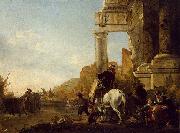Wholesale Oil Painting No Minimum |
|||||||||||
|
|
|||||||||||

|
|||||||||||
|
|
|
||||||||
Jan Baptist Weenix(Amsterdam, 1621- Vleuten 1660), a painter of the Dutch Golden Age. Despite his relatively brief career, he was a very productive and versatile painter. His favourite subjects were Italian landscapes with large figures among ruins, seaside views, and, later in life, large still life pictures of dead game or dogs. He was mainly responsible for introducing the Italian harbour scene into Dutch art, in mid-size paintings with a group of figures in the foreground. Weenix was the son of an architect and born near Amsterdam's harbour. He could not speak well, apparently from a medical condition, and because he very much liked to read books, his mother sent him to work for a bookseller, who was not able to deal with him. He drew whenever he could, according to Jan Weenix his son, who told the story to Arnold Houbraken. Weenix first studied under Jan Micker, then in Utrecht under Abraham Bloemaert, and later back in Amsterdam under Claes Cornelisz. Moeyaert. In 1643 Weenix travelled to Rome with Nicolaes Pieterszoon Berchem. He had left his home secretly, but his wife, the daughter of Gillis d'Hondecoeter, traced him to Rotterdam. Then he was allowed to stay away for four months. In Rome he became a member of the Bentvueghels and was much esteemed and worked for Pope Innocent X. He returned to Amsterdam after four years; his wife had refused to come to Rome. In 1649 he became master of the guild of St. Luke in Utrecht and also painted a portrait of Rene Descartes. When his brother-in-law Gijsbert d'Hondecoeter died, he trained his nephew Melchior d'Hondecoeter, together with his own son Jan Weenix. Weenix moved to a castle outside Utrecht, to concentrate on his work or for health reasons, where he probably died in poor circumstances, at an unknown date. He painted a few religious scenes, one of the rare pieces of this kind being the "Jacob and Esau" (Gemäldegalerie Alte Meister, Dresden). In the National Gallery, London, is a "Hunting Scene" by Weenix, and Glasgow has a characteristic painting of ruins. Weenix is represented at most of the important continental galleries, notably at Munich, Vienna, Berlin, Amsterdam, and St Petersburg. |
||||||||
|
|
||||||||
River Crossing
River Crossing Painting ID:: 90803 |
1647
Medium oil on canvas
Dimensions 100 x 131.5 cm (39.4 x 51.8 in)
cyf 1647 Medium oil on canvas Dimensions 100 x 131.5 cm (39.4 x 51.8 in) cyf |
|||||||
|
CONTACT US |

